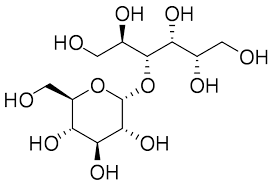Maltitol

Product Description
Maltitol is a sugar alcohol derived from maltose with various industrial and commercial applications.
Product:
Maltitol
CAS:
585-88-6
Synonym:
Maltisorb; 4-O-α-Glucopyranosyl-D-sorbitol
Structure:

Typical Characteristics
Appearance
White crystalline powder
Density
1.36 g/cm3
Melting point
149-152 °C
Molecular Weight
344.31
Odor
Neutral odor
Purity
≥98%
Refractive index
1.634
Uses, Applications & Markets
Key applications
get a quote



Maltitol used in many
industry applications
Maltitol is a sugar alcohol derived from maltose with various industrial and commercial applications. Here are some of its uses:
- Food and Beverage Industry: Maltitol is commonly used as a low-calorie sweetener and sugar substitute in the food and beverage industry. It provides sweetness without the same caloric content as sucrose and is often used in sugar-free and reduced-calorie products such as candies, chocolates, chewing gum, baked goods, and beverages.
- Bulking Agent: Maltitol serves as a bulking agent and texture enhancer in food products, helping to mimic the texture and mouthfeel of sugar. It can replace sucrose in recipes without significantly affecting the taste or texture of the final product, making it suitable for use in various food formulations.
- Humectant: Maltitol is used as a humectant in food processing to help retain moisture and prevent drying or crystallization in baked goods and confectionery products. It can improve the shelf life and sensory qualities of foods by maintaining their freshness, softness, and chewiness over time.
- Stabilizer: Maltitol functions as a stabilizer and crystallization inhibitor in food systems, preventing the formation of sugar crystals and ensuring the smooth texture and uniform appearance of products such as frostings, fillings, and icings.
- Dental Products: Maltitol is used in the formulation of dental care products such as sugar-free chewing gum, mints, and oral hygiene products. It provides sweetness without promoting tooth decay and can help stimulate saliva flow, which contributes to oral health and cavity prevention.
- Pharmaceuticals: Maltitol may be used as an excipient or sweetening agent in the pharmaceutical industry. It can be included in liquid medications, syrups, and chewable tablets to improve taste, mask bitterness, and enhance patient compliance, especially for pediatric and geriatric formulations.
- Functional Foods: Maltitol is used in the production of functional foods and dietary supplements targeting consumers seeking sugar reduction or management of blood sugar levels. It can be incorporated into products such as protein bars, meal replacement shakes, and nutritional beverages to provide sweetness and texture while reducing overall sugar content.
- Diabetic Products: Maltitol is often used in diabetic-friendly or sugar-free products as a sugar substitute that has a minimal impact on blood glucose levels. It provides sweetness without causing rapid spikes in blood sugar, making it suitable for individuals with diabetes or those following a low-glycemic diet.
- Ice Cream and Frozen Desserts: Maltitol is used in the production of sugar-free or reduced-sugar ice cream, frozen desserts, and dairy products. It can improve the texture, creaminess, and sweetness of these products while reducing the total carbohydrate content and calorie count.
- Confectionery Coatings: Maltitol is used as a coating agent for confectionery products such as chocolates, candies, and coated nuts. It provides a smooth, glossy finish and helps to preserve the freshness and appearance of the confections during storage and transportation.